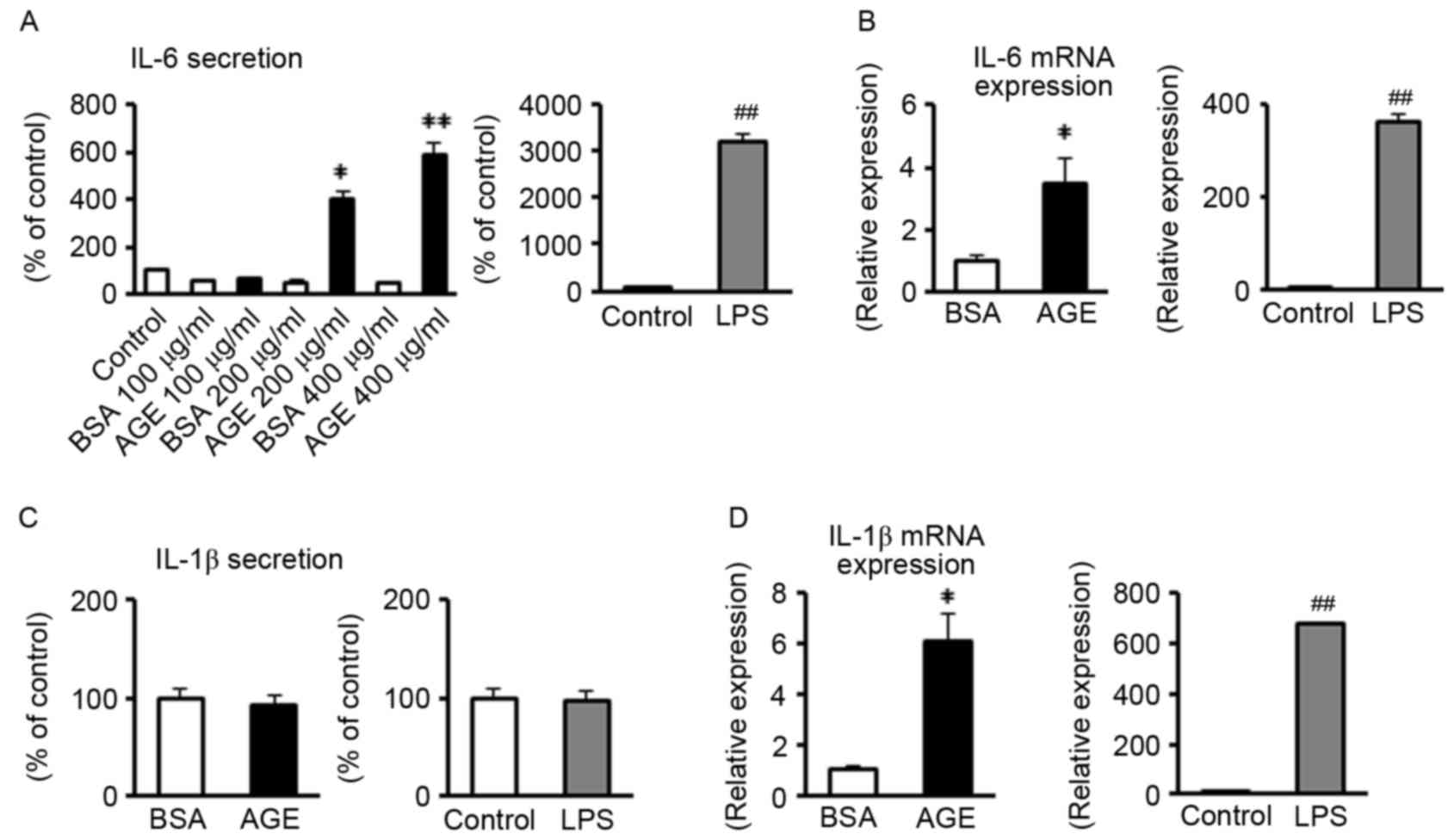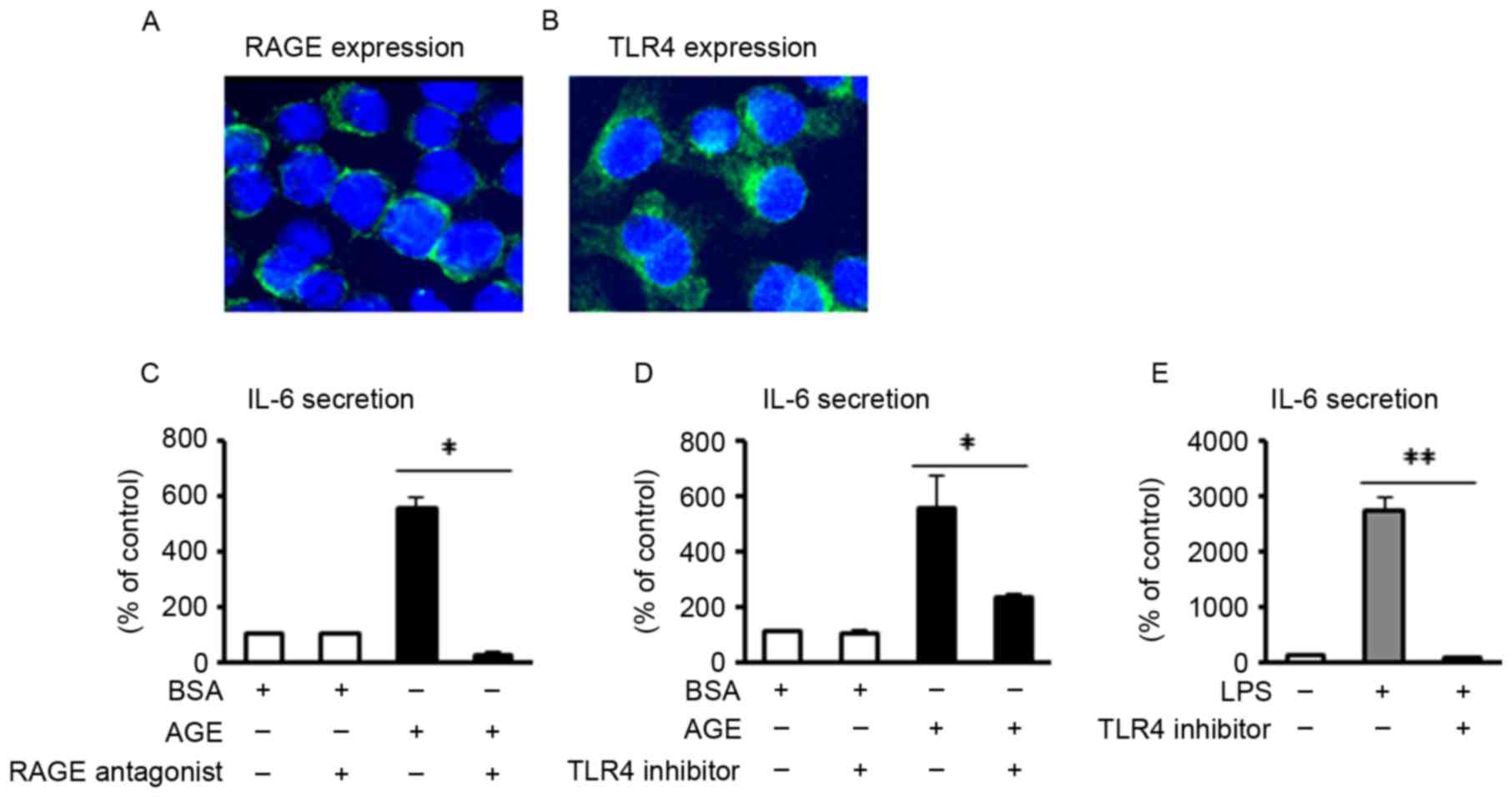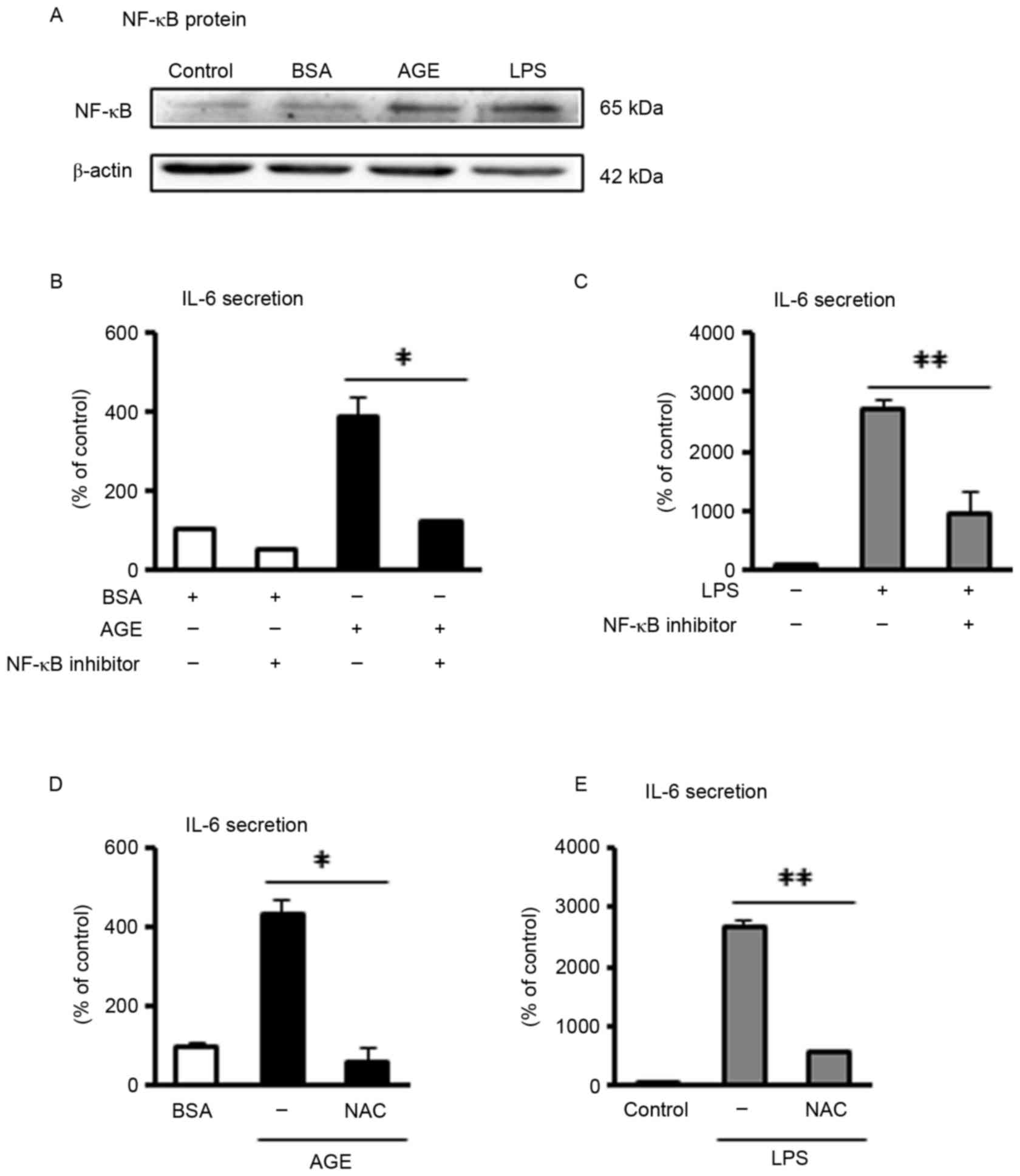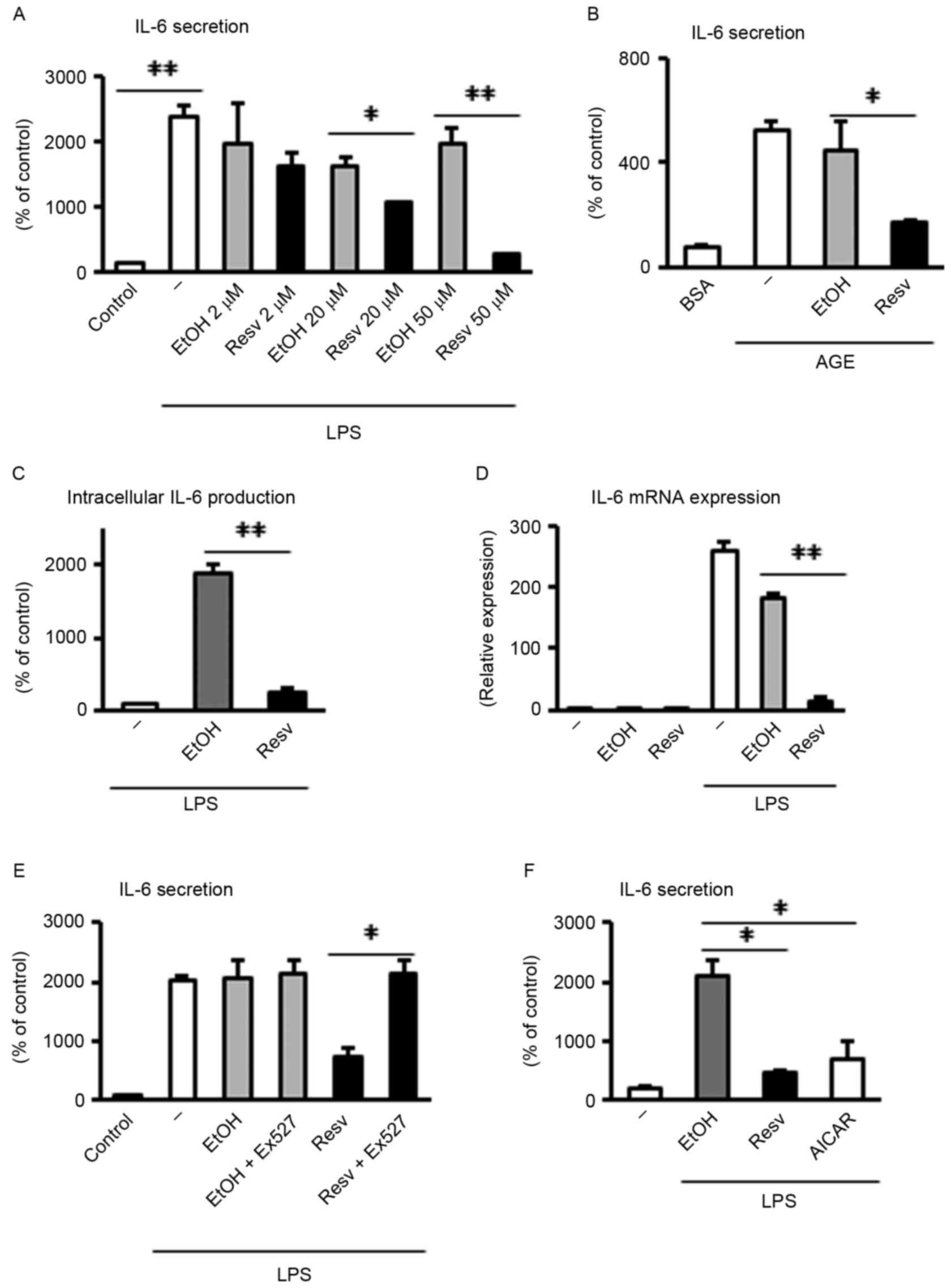|
1
|
Laresgoiti-Servitje E: A leading role for
the immune system in the pathophysiology of preeclampsia. J Leukoc
Biol. 94:247–257. 2013. View Article : Google Scholar : PubMed/NCBI
|
|
2
|
Faas MM, Spaans F and De Vos P: Monocytes
and macrophages in pregnancy and pre-eclampsia. Front Immunol.
5:2982014. View Article : Google Scholar : PubMed/NCBI
|
|
3
|
Care AS, Diener KR, Jasper MJ, Brown HM,
Ingman WV and Robertson SA: Macrophages regulate corpus luteum
development during embryo implantation in mice. J Clin Invest.
123:3472–3487. 2013. View
Article : Google Scholar : PubMed/NCBI
|
|
4
|
Sacks GP, Studena K, Sargent K and Redman
CW: Normal pregnancy and preeclampsia both produce inflammatory
changes in peripheral blood leukocytes akin to those of sepsis. Am
J Obstet Gynecol. 179:80–86. 1998. View Article : Google Scholar : PubMed/NCBI
|
|
5
|
Melgert BN, Spaans F, Borghuis T, Klok PA,
Groen B, Bolt A, de Vos P, van Pampus MG, Wong TY, van Goor H, et
al: Pregnancy and preeclampsia affect monocyte subsets in humans
and rats. PLoS One. 7:e452292012. View Article : Google Scholar : PubMed/NCBI
|
|
6
|
Lau SY, Guild SJ, Barrett CJ, Chen Q,
McCowan L, Jordan V and Chamley LW: Tumor necrosis factor-alpha,
interleukin-6, and interleukin-10 levels are altered in
preeclampsia: A systematic review and meta-analysis. Am J Reprod
Immunol. 70:412–427. 2013.PubMed/NCBI
|
|
7
|
Robertson SA, Skinner RJ and Care AS:
Essential role for IL-10 in resistance to
lipopolysaccharide-induced preterm labor in mice. J Immunol.
177:4888–4896. 2006. View Article : Google Scholar : PubMed/NCBI
|
|
8
|
Romero R, Sirtori M, Oyarzun E, Avila C,
Mazor M, Callahan R, Sabo V, Athanassiadis AP and Hobbins JC:
Infection and labor. V. Prevalence, microbiology, and clinical
significance of intraamniotic infection in women with preterm labor
and intact membranes. Am J Obstet Gynecol. 161:817–824. 1989.
View Article : Google Scholar : PubMed/NCBI
|
|
9
|
Meis PJ, Goldenberg RL, Mercer B, Moawad
A, Das A, McNellis D, Johnson F, Iams JD, Thom E and Andrews WW:
The preterm prediction study: Significance of vaginal infections.
National Institute of Child Health and Human Development
Maternal-Fetal Medicine Units Network. Am J Obstet Gynecol.
173:1231–1235. 1995. View Article : Google Scholar : PubMed/NCBI
|
|
10
|
Bo QL, Chen YH, Yu Z, Fu L, Zhou Y, Zhang
GB, Wang H, Zhang ZH and Xu DX: Rosiglitazone pretreatment protects
against lipopolysaccharide-induced fetal demise through inhibiting
placental inflammation. Mol Cell Endocrinol. 423:51–59. 2016.
View Article : Google Scholar : PubMed/NCBI
|
|
11
|
John WG and Lamb EJ: The Maillard or
browning reaction in diabetes. Eye (Lond). 7:230–237. 1993.
View Article : Google Scholar : PubMed/NCBI
|
|
12
|
Lotze MT and Tracey KJ: High-mobility
group box 1 protein (HMGB1): Nuclear weapon in the immune arsenal.
Nat Rev Immunol. 5:331–342. 2005. View
Article : Google Scholar : PubMed/NCBI
|
|
13
|
Chekir C, Nakatsuka M, Noguchi S, Konishi
H, Kamada Y, Sasaki A, Hao L and Hiramatsu Y: Accumulation of
advanced glycation end products in women with preeclampsia:
Possible involvement of placental oxidative and nitrative stress.
Placenta. 27:225–233. 2006. View Article : Google Scholar : PubMed/NCBI
|
|
14
|
Naruse K, Sado T, Noguchi T, Tsunemi T,
Yoshida S, Akasaka J, Koike N, Oi H and Kobayashi H: Peripheral
RAGE (receptor for advanced glycation endproducts)-ligands in
normal pregnancy and preeclampsia: Novel markers of inflammatory
response. J Reprod Immunol. 93:69–74. 2012. View Article : Google Scholar : PubMed/NCBI
|
|
15
|
Hao L, Noguchi S, Kamada Y, Sasaki A,
Matsuda M, Shimizu K, Hiramatsu Y and Nakatsuka M: Adverse effects
of advanced glycation end products on embryonal development. Acta
Med Okayama. 62:93–99. 2008.PubMed/NCBI
|
|
16
|
Huang QT, Zhang M, Zhong M, Yu YH, Liang
WZ, Hang LL, Gao YF, Huang LP and Wang ZJ: Advanced glycation end
products as an upstream molecule triggers ROS-induced sFlt-1
production in extravillous trophoblasts: A novel bridge between
oxidative stress and preeclampsia. Placenta. 34:1177–1182. 2013.
View Article : Google Scholar : PubMed/NCBI
|
|
17
|
Akira S, Uematsu S and Takeuchi O:
Pathogen recognition and innate immunity. Cell. 124:783–801. 2006.
View Article : Google Scholar : PubMed/NCBI
|
|
18
|
Ibrahim ZA, Armour CL, Phipps S and Sukkar
MB: RAGE and TLRs: Relatives, friends or neighbours? Mol Immunol.
56:739–744. 2013. View Article : Google Scholar : PubMed/NCBI
|
|
19
|
Szmitko PE and Verma S: Cardiology patient
pages. Red wine and your heart. Circulation. 111:e10–e11. 2005.
View Article : Google Scholar : PubMed/NCBI
|
|
20
|
Ponzo V, Soldati L and Bo S: Resveratrol:
A supplementation for men or for mice? J Transl Med. 12:1582014.
View Article : Google Scholar : PubMed/NCBI
|
|
21
|
Jang M, Cai L, Udeani GO, Slowing KV,
Thomas CF, Beecher CW, Fong HH, Farnsworth NR, Kinghorn AD, Mehta
RG, et al: Cancer chemopreventive activity of resveratrol, a
natural product derived from grapes. Science. 275:218–220. 1997.
View Article : Google Scholar : PubMed/NCBI
|
|
22
|
Baur JA, Pearson KJ, Price NL, Jamieson
HA, Lerin C, Kalra A, Prabhu VV, Allard JS, Lopez-Lluch G, Lewis K,
et al: Resveratrol improves health and survival of mice on a
high-calorie diet. Nature. 444:337–342. 2006. View Article : Google Scholar : PubMed/NCBI
|
|
23
|
Wang F, Tian X, Zhang L, He C, Ji P, Li Y,
Tan D and Liu G: Beneficial effect of resveratrol on bovine oocyte
maturation and subsequent embryonic development after in vitro
fertilization. Fertil Steril. 101:577–586. 2014. View Article : Google Scholar : PubMed/NCBI
|
|
24
|
Valenzano DR, Terzibasi E, Genade T,
Cattaneo A, Domenici L and Cellerino A: Resveratrol prolongs
lifespan and retards the onset of age-related markers in a
short-lived vertebrate. Curr Biol. 16:296–300. 2006. View Article : Google Scholar : PubMed/NCBI
|
|
25
|
Price NL, Gomes AP, Ling AJ, Duarte FV,
Martin-Montalvo A, North BJ, Agarwal B, Ye L, Ramadori G, Teodoro
JS, et al: SIRT1 is required for AMPK activation and the beneficial
effects of resveratrol on mitochondrial function. Cell Metab.
15:675–690. 2012. View Article : Google Scholar : PubMed/NCBI
|
|
26
|
Kawasaki Y, Aoki Y, Magata F, Miyamoto A,
Kawashima C, Hojo T, Okuda K, Shirasuna K and Shimizu T: The effect
of single nucleotide polymorphisms in the tumor necrosis factor-α
gene on reproductive performance and immune function in dairy
cattle. J Reprod Dev. 60:173–178. 2014. View Article : Google Scholar : PubMed/NCBI
|
|
27
|
Livak KJ and Schmittgen TD: Analysis of
relative gene expression data using real-time quantitative PCR and
the 2(-Delta Delta C(T)) Method. Methods. 25:402–408. 2001.
View Article : Google Scholar : PubMed/NCBI
|
|
28
|
Brasier AR: The nuclear
factor-kappaB-interleukin-6 signalling pathway mediating vascular
inflammation. Cardiovasc Res. 86:211–218. 2010. View Article : Google Scholar : PubMed/NCBI
|
|
29
|
Yin QQ, Dong CF, Dong SQ, Dong XL, Hong Y,
Hou XY, Luo DZ, Pei JJ and Liu XP: AGEs induce cell death via
oxidative and endoplasmic reticulum stresses in both human SH-SY5Y
neuroblastoma cells and rat cortical neurons. Cell Mol Neurobiol.
32:1299–1309. 2012. View Article : Google Scholar : PubMed/NCBI
|
|
30
|
Lin JK and Tsai SH: Chemoprevention of
cancer and cardiovascular disease by resveratrol. Proc Natl Sci
Counc Repub China B. 23:99–106. 1999.PubMed/NCBI
|
|
31
|
Berbaum K, Shanmugam K, Stuchbury G, Wiede
F, Körner H and Munch G: Induction of novel cytokines and
chemokines by advanced glycation endproducts determined with a
cytometric bead array. Cytokine. 41:198–203. 2008. View Article : Google Scholar : PubMed/NCBI
|
|
32
|
Lappas M, Permezel M and Rice GE: Advanced
glycation endproducts mediate pro-inflammatory actions in human
gestational tissues via nuclear factor-kappaB and extracellular
signal-regulated kinase 1/2. J Endocrinol. 193:269–277. 2007.
View Article : Google Scholar : PubMed/NCBI
|
|
33
|
Liu J, Zhao S, Tang J, Li Z, Zhong T, Liu
Y, Chen D, Zhao M, Li Y, Gong X, et al: Advanced glycation end
products and lipopolysaccharide synergistically stimulate
proinflammatory cytokine/chemokine production in endothelial cells
via activation of both mitogen-activated protein kinases and
nuclear factor-kappaB. FEBS J. 276:4598–4606. 2009. View Article : Google Scholar : PubMed/NCBI
|
|
34
|
Chen YJ, Sheu ML, Tsai KS, Yang RS and Liu
SH: Advanced glycation end products induce peroxisome
proliferator-activated receptor γ down-regulation-related
inflammatory signals in human chondrocytes via Toll-like receptor-4
and receptor for advanced glycation end products. PLoS One.
8:e666112013. View Article : Google Scholar : PubMed/NCBI
|
|
35
|
Shim E and Babu JP: Glycated albumin
produced in diabetic hyperglycemia promotes monocyte secretion of
inflammatory cytokines and bacterial adherence to epithelial cells.
J Periodontal Res. 50:197–204. 2015. View Article : Google Scholar : PubMed/NCBI
|
|
36
|
Dragone T, Cianciulli A, Calvello R, Porro
C, Trotta T and Panaro MA: Resveratrol counteracts
lipopolysaccharide-mediated microglial inflammation by modulating a
SOCS-1 dependent signaling pathway. Toxicol In Vitro. 28:1126–1135.
2014. View Article : Google Scholar : PubMed/NCBI
|
|
37
|
Jin X, Yao T, Zhou Z, Zhu J, Zhang S, Hu W
and Shen C: Advanced Glycation End Products Enhance Macrophages
Polarization into M1 Phenotype through Activating RAGE/NF-κB
Pathway. Biomed Res Int. 2015:7324502015. View Article : Google Scholar : PubMed/NCBI
|
|
38
|
Schroder K, Zhou R and Tschopp J: The
NLRP3 inflammasome: A sensor for metabolic danger? Science.
327:296–300. 2010. View Article : Google Scholar : PubMed/NCBI
|
|
39
|
Takahashi M: Role of the inflammasome in
myocardial infarction. Trends Cardiovasc Med. 21:37–41. 2011.
View Article : Google Scholar : PubMed/NCBI
|
|
40
|
Ott C, Jacobs K, Haucke E, Santos
Navarrete A, Grune T and Simm A: Role of advanced glycation end
products in cellular signaling. Redox Biol. 2:411–429. 2014.
View Article : Google Scholar : PubMed/NCBI
|
|
41
|
Vénéreau E, Ceriotti C and Bianchi ME:
DAMPs from cell death to new life. Front Immunol. 6:4222015.
View Article : Google Scholar : PubMed/NCBI
|
|
42
|
Cheng A, Dong Y, Zhu F, Liu Y, Hou FF and
Nie J: AGE-LDL activates Toll like receptor 4 pathway and promotes
inflammatory cytokines production in renal tubular epithelial
cells. Int J Biol Sci. 9:94–107e. 2013. View Article : Google Scholar : PubMed/NCBI
|
|
43
|
Shirasuna K, Seno K, Ohtsu A, Shiratsuki
S, Ohkuchi A, Suzuki H, Matsubara S, Nagayama S, Iwata H and
Kuwayama T: AGEs and HMGB1 increase inflammatory cytokine
production from human placental cells, resulting in an enhancement
of monocyte migration. Am J Reprod Immunol. 75:557–568. 2016.
View Article : Google Scholar : PubMed/NCBI
|
|
44
|
Shirasuna K, Takano H, Seno K, Ohtsu A,
Karasawa T, Takahashi M, Ohkuchi A, Suzuki H, Matsubara S, Iwata H
and Kuwayama T: Palmitic acid induces interleukin-1β secretion via
NLRP3 inflammasomes and inflammatory responses through ROS
production in human placental cells. J Reprod Immunol. 116:104–112.
2016. View Article : Google Scholar : PubMed/NCBI
|
|
45
|
Ishibashi Y, Matsui T, Takeuchi M and
Yamagishi S: Rosuvastatin blocks advanced glycation end
products-elicited reduction of macrophage cholesterol efflux by
suppressing NADPH oxidase activity via inhibition of
geranylgeranylation of Rac-1. Horm Metab Res. 43:619–624. 2011.
View Article : Google Scholar : PubMed/NCBI
|
|
46
|
Feng L, Zhu MM, Zhang MH, Wang RS, Tan XB,
Song J, Ding SM, Jia XB and Hu SY: Protection of glycyrrhizic acid
against AGEs-induced endothelial dysfunction through inhibiting
RAGE/NF-κB pathway activation in human umbilical vein endothelial
cells. J Ethnopharmacol. 148:27–36. 2013. View Article : Google Scholar : PubMed/NCBI
|
|
47
|
Lorne E, Dupont H and Abraham E: Toll-like
receptors 2 and 4: Initiators of non-septic inflammation in
critical care medicine? Intensive Care Med. 36:1826–1835. 2010.
View Article : Google Scholar : PubMed/NCBI
|
|
48
|
Yi CO, Jeon BT, Shin HJ, Jeong EA, Chang
KC, Lee JE, Lee DH, Kim HJ, Kang SS, Cho GJ, et al: Resveratrol
activates AMPK and suppresses LPS-induced NF-κB-dependent COX-2
activation in RAW 264.7 macrophage cells. Anat Cell Biol.
44:194–203. 2011. View Article : Google Scholar : PubMed/NCBI
|
|
49
|
Lappas M, Mitton A, Lim R, Barker G, Riley
C and Permezel M: SIRT1 is a novel regulator of key pathways of
human labor. Biol Reprod. 84:167–178. 2011. View Article : Google Scholar : PubMed/NCBI
|
|
50
|
Nakamaru Y, Vuppusetty C, Wada H, Milne
JC, Ito M, Rossios C, Elliot M, Hogg J, Kharitonov S, Goto H, et
al: A protein deacetylase SIRT1 is a negative regulator of
metalloproteinase-9. FASEB J. 23:2810–2819. 2009. View Article : Google Scholar : PubMed/NCBI
|
|
51
|
Labuzek K, Liber S, Gabryel B, Bułdak L
and Okopień B: Ambivalent effects of compound C (dorsomorphin) on
inflammatory response in LPS-stimulated rat primary microglial
cultures. Naunyn Schmiedebergs Arch Pharmacol. 381:41–57. 2010.
View Article : Google Scholar : PubMed/NCBI
|
|
52
|
Furuya H, Taguchi A, Kawana K, Yamashita
A, Inoue E, Yoshida M, Nakamura H, Fujimoto A, Inoue T, Sato M, et
al: Resveratrol protects against pathological preterm birth by
suppression of macrophage-mediated inflammation. Reprod Sci.
22:1561–1568. 2015. View Article : Google Scholar : PubMed/NCBI
|
|
53
|
Chen L, Yang S, Zumbrun EE, Guan H,
Nagarkatti PS and Nagarkatti M: Resveratrol attenuates
lipopolysaccharide-induced acute kidney injury by suppressing
inflammation driven by macrophages. Mol Nutr Food Res. 59:853–864.
2015. View Article : Google Scholar : PubMed/NCBI
|


















